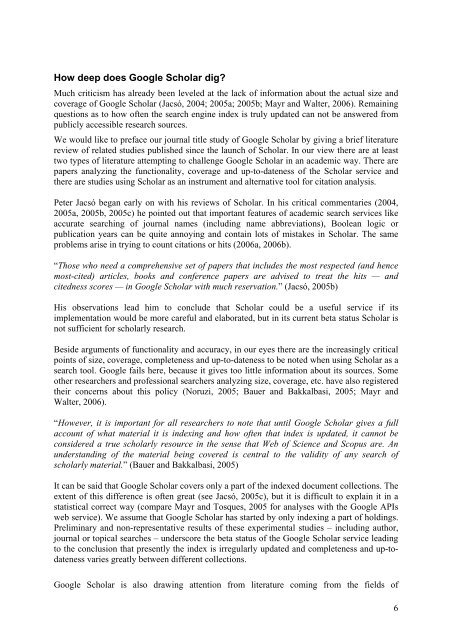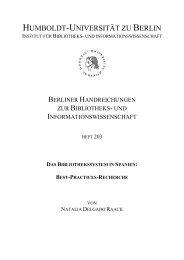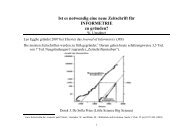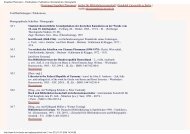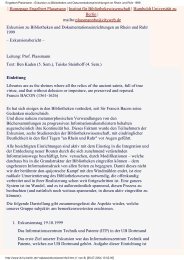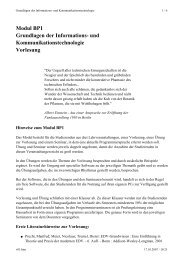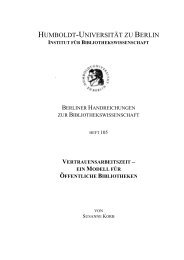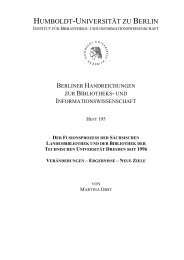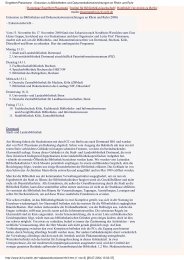An exploratory study of Google Scholar
An exploratory study of Google Scholar
An exploratory study of Google Scholar
Create successful ePaper yourself
Turn your PDF publications into a flip-book with our unique Google optimized e-Paper software.
How deep does <strong>Google</strong> <strong>Scholar</strong> dig?<br />
Much criticism has already been leveled at the lack <strong>of</strong> information about the actual size and<br />
coverage <strong>of</strong> <strong>Google</strong> <strong>Scholar</strong> (Jacsó, 2004; 2005a; 2005b; Mayr and Walter, 2006). Remaining<br />
questions as to how <strong>of</strong>ten the search engine index is truly updated can not be answered from<br />
publicly accessible research sources.<br />
We would like to preface our journal title <strong>study</strong> <strong>of</strong> <strong>Google</strong> <strong>Scholar</strong> by giving a brief literature<br />
review <strong>of</strong> related studies published since the launch <strong>of</strong> <strong>Scholar</strong>. In our view there are at least<br />
two types <strong>of</strong> literature attempting to challenge <strong>Google</strong> <strong>Scholar</strong> in an academic way. There are<br />
papers analyzing the functionality, coverage and up-to-dateness <strong>of</strong> the <strong>Scholar</strong> service and<br />
there are studies using <strong>Scholar</strong> as an instrument and alternative tool for citation analysis.<br />
Peter Jacsó began early on with his reviews <strong>of</strong> <strong>Scholar</strong>. In his critical commentaries (2004,<br />
2005a, 2005b, 2005c) he pointed out that important features <strong>of</strong> academic search services like<br />
accurate searching <strong>of</strong> journal names (including name abbreviations), Boolean logic or<br />
publication years can be quite annoying and contain lots <strong>of</strong> mistakes in <strong>Scholar</strong>. The same<br />
problems arise in trying to count citations or hits (2006a, 2006b).<br />
“Those who need a comprehensive set <strong>of</strong> papers that includes the most respected (and hence<br />
most-cited) articles, books and conference papers are advised to treat the hits — and<br />
citedness scores — in <strong>Google</strong> <strong>Scholar</strong> with much reservation.” (Jacsó, 2005b)<br />
His observations lead him to conclude that <strong>Scholar</strong> could be a useful service if its<br />
implementation would be more careful and elaborated, but in its current beta status <strong>Scholar</strong> is<br />
not sufficient for scholarly research.<br />
Beside arguments <strong>of</strong> functionality and accuracy, in our eyes there are the increasingly critical<br />
points <strong>of</strong> size, coverage, completeness and up-to-dateness to be noted when using <strong>Scholar</strong> as a<br />
search tool. <strong>Google</strong> fails here, because it gives too little information about its sources. Some<br />
other researchers and pr<strong>of</strong>essional searchers analyzing size, coverage, etc. have also registered<br />
their concerns about this policy (Noruzi, 2005; Bauer and Bakkalbasi, 2005; Mayr and<br />
Walter, 2006).<br />
“However, it is important for all researchers to note that until <strong>Google</strong> <strong>Scholar</strong> gives a full<br />
account <strong>of</strong> what material it is indexing and how <strong>of</strong>ten that index is updated, it cannot be<br />
considered a true scholarly resource in the sense that Web <strong>of</strong> Science and Scopus are. <strong>An</strong><br />
understanding <strong>of</strong> the material being covered is central to the validity <strong>of</strong> any search <strong>of</strong><br />
scholarly material.” (Bauer and Bakkalbasi, 2005)<br />
It can be said that <strong>Google</strong> <strong>Scholar</strong> covers only a part <strong>of</strong> the indexed document collections. The<br />
extent <strong>of</strong> this difference is <strong>of</strong>ten great (see Jacsó, 2005c), but it is difficult to explain it in a<br />
statistical correct way (compare Mayr and Tosques, 2005 for analyses with the <strong>Google</strong> APIs<br />
web service). We assume that <strong>Google</strong> <strong>Scholar</strong> has started by only indexing a part <strong>of</strong> holdings.<br />
Preliminary and non-representative results <strong>of</strong> these experimental studies – including author,<br />
journal or topical searches – underscore the beta status <strong>of</strong> the <strong>Google</strong> <strong>Scholar</strong> service leading<br />
to the conclusion that presently the index is irregularly updated and completeness and up-todateness<br />
varies greatly between different collections.<br />
<strong>Google</strong> <strong>Scholar</strong> is also drawing attention from literature coming from the fields <strong>of</strong><br />
6


